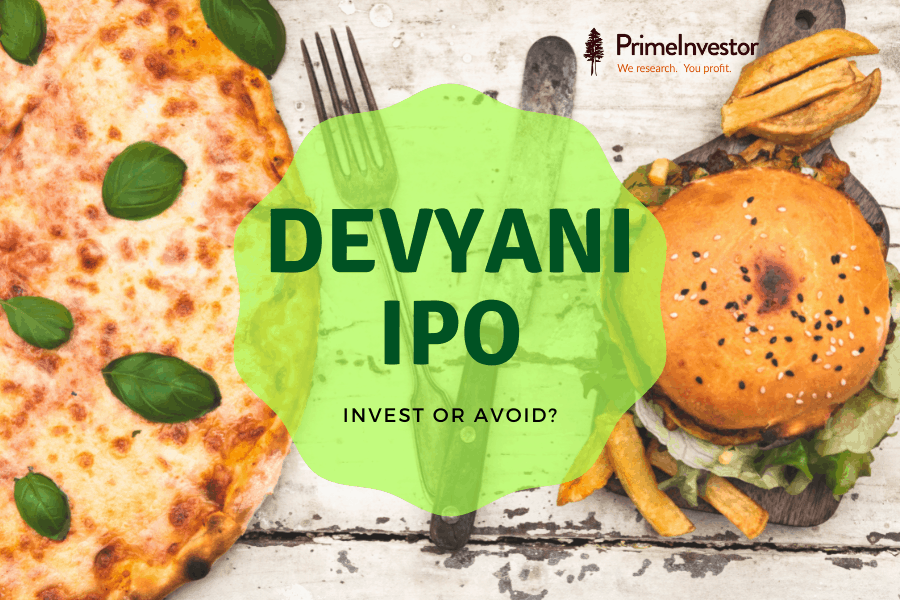A theme that seems to be surfacing in the IPOs this year appears to be food-related! On the heels of Zomato, Burger King, and Mrs Bectors comes the Devyani International IPO. This company runs the KFC and Pizza Hut chains across the country. It has other restaurant chains too, but the bulk of its revenues come from these two. Devyani International is aiming to raise approximately Rs 1,838 crore through its IPO.

Of this, Rs 440 crore is a fresh issue which will primarily be used to pay off the chunk of the company’s debt obligations. The remaining is an offer for sale by Dunearn Investments, a PE investor, and the promoter group.
The QSR (quick service restaurant) space is a fast-growing one, projected to grow at a CAGR of 12% over the next 5 years. The format also lends itself more to takeaways, which can buttress sales better than formats that cater more to dining-in. The brands KFC and Pizza Hut need no introduction, and KFC in particular has seen rapid growth.
But in our view, the Devyani International IPO offers no advantage to Jubilant FoodWorks (Domino’s Pizza and Dunkin’ Donuts, among others), which sports better margins and is steadily profitable. Nor is it any different from Burger King India (Burger King) and Westlife Development (McDonald’s), the other two listed QSR players. Like Devyani International, both companies have notable brands but are severely lossmaking. Until Devyani International offers better visibility on sustenance of profitability, growth and expansion, the IPO can be skipped. Here’s more.
Patchy record
Devyani International (DIL) is a franchisee of Yum Brands Inc in India. It operates the KFC and Pizza Hut chains, but it is not an exclusive franchise. So, while the two brands have the heft, Devyani International competes with other franchisees for the same market. The company has a wide geographical presence, but is heavily skewed towards five market regions where demand is strong – Bengaluru, Mumbai, Hyderabad, Delhi-NCR and Kolkata.
In store growth, Devyani International has chalked an unsteady path. Its KFC store count has grown at a healthy pace of 25% CAGR to 264 outlets between FY-19 and FY-21. Its KFC network has seen few store closures, and DIL even acquired a good 51 KFC outlets in FY-21.
With Pizza Hut on the other hand, store expansion has been sedate at 9%, with outlet numbers standing at 297 – not many more than KFC despite being an older brand. Devyani International Limited closed about half as many Pizza Hut outlets as it opened over the past three years. Pizza Hut’s network – and therefore the ability of the brand to support growth – pales considerably compared to Domino’s Pizza’s 1,380 outlets. DIL has, earlier, failed to meet development targets within the prescribed timelines set out in its KFC/Pizza Hut franchise agreements.
In its third Costa Coffee chain, Devyani International Limited’s record is even poorer. Devyani International Limited shut more Costa Coffee outlets than it opened, resulting in the count dropping from 67 to 44 between March 2019 and 2021. Devyani International Limited’s inability to meet development targets set in its franchise agreement resulted in the company losing its exclusive rights to the Costa Coffee franchise in India, and refrained from opening additional outlets (though Devyani International Limited is now drawing up a new agreement).
This patchy record does not offer comfort to Devyani International Limited's ability to expand at a healthy or steady pace that can drive growth, or meet targets set out in franchise agreements.
Dependent on KFC
The Costa Coffee chain is a small revenue contributor – but it offered superior margins. The gross margin that the chain clocked in FY-19 and FY-20 stood at 20-21%, far better than the 10-18% that the Pizza Hut and KFC brands served up. The stymied growth on this chain, therefore, is a dampener on the margin front.
Pizza Hut is Devyani International Limited’s largest in terms of outlet count. But its performance is sedate, despite its many years of existence and strong brand recall. For one, expansion has been slow as explained above, especially in the face of aggressive expansion by competitors. Second, same-store sales growth (SSG) turned negative in FY-20. SSG measures growth in stores older than 1 year, which indicates how well a store does on a sustainable basis once its opened. Low SSG means that topline growth is driven only by new store additions and older stores fail to contribute. Pizza Hut’s negative SSG in FY-21 can be partly attributable to the pandemic-led shutdown. But then, other QSR chains such as Domino’s Pizza as well as DIL’s own KFC chain managed positive SSG. Revenue from the chain dropped in both FY-20 and FY-21 along with the number of transactions in each store.
Third, Pizza Hut has had uneven gross margins. Margins dipped to 10.5% in FY-20 (against 15.5% in FY-19) but improved a shade to 12.9% by FY-21. Revenue contribution dropped to 25% by FY-21 compared to the 32% in FY-19.
All this suggests that the Pizza Hut brand has been going slow and that it is failing to draw in customers. Unless the expansion scenario drastically changes, the Pizza Hut chain is unlikely to be a growth driver. The growth burden, therefore, lands squarely on the KFC chain’s shoulders.
Apart from a rapid and wide outlet rollout, KFC’s gross margins held up. While FY-20 did see a drop, margins have recovered in FY-21 back to earlier levels of 18%. While the number of transactions per store were lower in the FY-21 fiscal owing to the shutdowns, the chain clocked in higher per-order values to keep both revenue and margins up. It also managed positive SSG in FY-20 at 3.15%. Revenue expanded at a steady pace over the past 3 years, and contribution jumped to 57% in FY-21 from 35% in FY-19.
DIL has its own brands such as Vaango, Food Street and others, which it operates in malls, airports and so on. A reasonable revenue contribution of 16% in FY-19 and FY-20 dropped to 5% by FY-21 due to the pandemic. These businesses have, however, been loss-making on a gross level even as they contributed to a good share of revenue earlier.
In diversification, too, Devyani International Limited’s record has been uneven. As already noted, Costa Coffee hasn’t worked out. Next, DIL had launched a tea-trading business here and in the UK. That operation was unsuccessful and the company sold the business on a slump sale basis and suffered a Rs 30 crore impairment loss. Nor was it the first diversification venture that was shut for lack of profitability. Finally, DIL pushed into new markets of Nepal and Nigeria for the KFC and Pizza Hut chains. While these markets make up a tenth of revenues, the Nigeria arm has faced difficulties in loan repayments.
Therefore, KFC looks set to be Devyani International Limited’s only growth driver for now. This makes it no different from either Burger King or Westlife Development, which are also dependent on single brands. Expansion plans need to be watched for their sustained contribution to topline and profitability, until the company posts a steadier record of success. While Domino’s Pizza is the dominant brand for Jubilant FoodWorks as well, it is by far larger and stronger, and the company has managed to push through some diversification through other brands too.
Loss-making
On financials, there are a few positives. One, at the EBIDTA level, Devyani International Limited is profitable. EBIDTA margins are healthy at 18-20%. This places it above Burger King or Westlife Development, though still below Jubilant FoodWorks. Two, interest costs can drop as the company utilises Rs 324 crore IPO proceeds to repay the chunk of its borrowings. Interest currently eats up 10% of revenues.
Of course, should the company take on fresh debt to bankroll expansion, this can move back up. Even so, the company’s profitability even after interest costs is still a notch better than others. DIL’s revenue hit of 25% in FY-21 was also better than Burger King and Westlife Development, whose revenues shrunk 36-41%.
However, DIL’s undoing is depreciation costs, which account for a massive 15% of revenue resulting in net losses for the company. Leasehold assets have high depreciation, and this factor will therefore be one that persists. Depreciation costs for DIL are higher than other QSR players. The company will have to ramp up EBIDTA-level profitability by a larger margin if it has to turn accounting profits; the company does post positive operating cash flows.
DIL has also had to contend with one-offs such as impairment loss that has further weighed on net losses. Accumulated losses had pushed DIL into negative networth in both FY-19 and FY-20, prompting auditors to make a note of the same in their notes. Only an equity infusion of about Rs 347 crore in FY-21 (by Yum India and promoters) reversed this.
Persistent net loss, therefore, makes it hard to work out valuation metrics. On a post-issue marketcap, Devyani International Limited’s marketcap to FY-21 sales works out to about 9.5 times. This is lower than both Jubilant FoodWorks and Burger King. On an EV-to-EBITDA basis too, the DIL IPO is priced better.
But relatively cheaper pricing on its own does not make up for DIL’s lack of visibility in profitability or ability to expand and push growth. In any case, the QSR space in general does not comprise listed companies that can boast of good ROEs or margins. Jubilant FoodWorks is an outlier, but is also an expensive bet and has gone through missteps in earlier years before getting its expansion plans right. For these reasons, it is best to watch how Devyani International improves before taking a long-term bet on it.
Please note that this review does not take into consideration the possibility of listing gains.





4 thoughts on “IPO Review: Devyani International – Invest or Avoid?”
Execllent Quality Writing. Best Wishes to Prime Investor for scaling up, fast
Thanks, sir! – Bhavana
Thanks for the detailed insights. This helps in deciding if one should apply or skip the issue.
Thanks! Glad you found it useful. – Regards, Bhavana
Comments are closed.